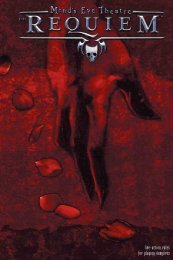Create successful ePaper yourself
Turn your PDF publications into a flip-book with our unique Google optimized e-Paper software.
Because so many ways of measuring the world exist, the<br />
methods of measurement and the specific results obtained<br />
aren’t the most important lesson here. The lesson is that<br />
all change can be measured, even spiritual change, if one<br />
has the proper tools and knowledge. How “evil” or “godly”<br />
a mortal or vampire is should be measurable as well. Doing<br />
so only requires a method of measurement and an<br />
appropriate scale — that not all methods are currently<br />
available to the Order is irrelevant to the philosophy.<br />
This revelation frightens many young vampires, especially<br />
when they reflect on how far they have fallen since<br />
their Embrace. But that is precisely the point — the<br />
Dragons are reminded, as with the Solitude Paradox, that<br />
by measuring the world they must themselves be subject<br />
to measurement, and should be ready to accept that. This<br />
precept isn’t necessarily a spiritual one (the Dragons long<br />
ago realized that the notion of doing unto others as they<br />
would have others do unto them was a death wish), but<br />
a realistic and scientific one. In order to change, they<br />
must understand their current situation and be able to<br />
recognize when something has changed. Another related<br />
lesson is one that any scientist knows: absence of evidence<br />
is not evidence of absence. If a Dragon observes<br />
no change in a subject (even herself), this does not mean<br />
no change has occurred, but only that she has not observed<br />
it. The favored students of the Ordo Dracul are<br />
the ones who take the least for granted, and remain open<br />
to all possibilities when considering change.<br />
✬✵★✪✻✰✵✮✂✪✯★✵✮✬<br />
Once a Dragon has learned to observe change reliably<br />
without interfering, her Ordo Dracul mentors will allow<br />
her to enact change. Different mentors have different<br />
ideas about whether it is best to allow Dragons to begin<br />
by changing the world around them or to focus on changing<br />
themselves first.<br />
Changing the world is a daunting proposition, but that’s<br />
why the early stages of training are designed to help Dragons<br />
gain some perspective. Deliberately enacting a change<br />
on a grand scale is difficult, and tracking the ripples such<br />
a change causes even more so. Even minute changes have<br />
far-reaching effects, however, and so mentors typically instruct<br />
their students to take some action not easily traceable<br />
to a particular being and then follow the chain of<br />
events. For instance, a vampire might sabotage a stoplight,<br />
causing a car accident. The Kindred then waits as<br />
the police arrive (and paramedics, if necessary), the mortals<br />
glower at each other, the cars are towed away, and so<br />
on. The Kindred now chooses one of the mortals involved<br />
and follows him to see how this change of “fate” has impacted<br />
his life. The target could be one of the mortals<br />
involved in the accident itself, one of the cops, the worker<br />
driving the tow truck or even a witness. (If a student coterie<br />
is involved, they might each choose a subject and<br />
then later compare notes.)<br />
Some very thorough<br />
Dragons choose one mortal<br />
in the beginning of the<br />
evening and arrange the<br />
events to involve him,<br />
watching carefully to see<br />
his reactions to the calamities<br />
in his life. (Sometimes<br />
Dragons arrange for positive<br />
changes, but it’s widely<br />
believed in the covenant<br />
that tragedy causes more<br />
educational changes.)<br />
Sometimes the Dragon<br />
only watches the mortal at<br />
night, reasoning that what<br />
happens during the day is<br />
out of the Kindred’s purview.<br />
Other, more ambitious<br />
members of the covenant<br />
believe that this sort<br />
of thinking isn’t at all conducive<br />
to transcendence<br />
and arrange for ghouls or<br />
other servants to watch<br />
their target while the Kindred<br />
slumbers.<br />
✭✶✳✳✶✾✰✵✮✂✻✯✬<br />
✫✹★✮✶✵’✺✂✻★✰✳<br />
As mentioned in Vampire:<br />
The Requiem, one of<br />
common lessons in enacting<br />
change involves killing<br />
a single mortal and then<br />
following the chain of<br />
events his death causes.<br />
This lesson has many<br />
variations, however, depending<br />
on the mentor<br />
and student in question.<br />
A mentor might assign<br />
a coterie to kill one mortal,<br />
and then “follow the<br />
dragon’s tail,” noting as<br />
many changes and reactions<br />
as possible. Several<br />
Kindred being involved<br />
allows the students to<br />
check each other’s findings,<br />
pursue avenues of<br />
investigation not open to<br />
a lone vampire and, if<br />
necessary, protect one<br />
another from retribution.<br />
unlife in the ordo dracul<br />
33<br />
chapter two<br />
6



